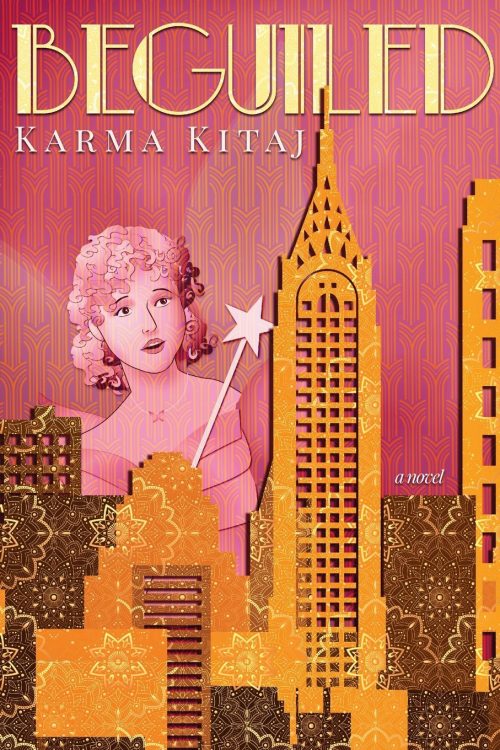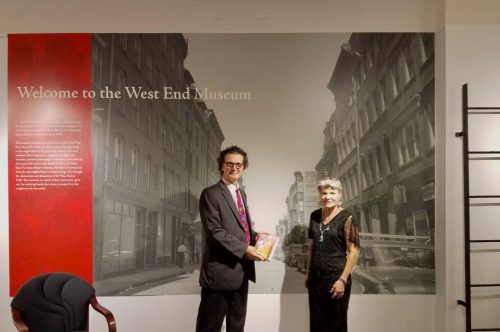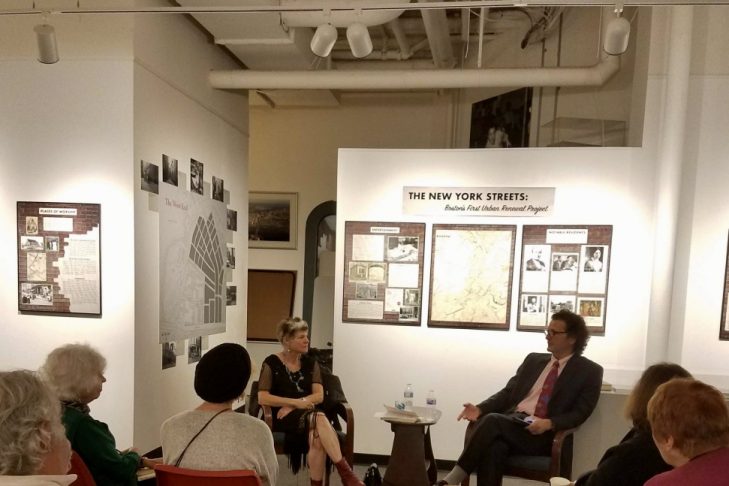Brookline author Karma Kitaj’s new novel “Beguiled” is a coming-of-age story with local roots. Set in Boston’s storied West End neighborhood of the early-to-mid-1900s, the work of historical fiction centers on Miriam Levine, the daughter of Russian-Jewish immigrants.
On Sept. 26, Kitaj (pronounced KEY-tie) read passages from the book at The West End Museum in Boston. She was also interviewed by former museum director Duane Lucia and answered questions from the audience.
The first chapter, “The Homecoming,” begins in April 1922, as Miriam Levine trudges up the stairs of her parents’ home on Leverett Street in the Old West End, the wafts of immigrant cooking shifting from garlic to küchen as she ascends. We quickly learn that she has taken her baby, Aaron, and fled an abusive husband, the perfect Ethan her parents had pushed on her. From the comforts of her marital home on tree-lined Amory Street in Brookline, she was back in the ‘hood.
Plot twists abound as the novel winds through revelations and developments, not all of which Kitaj would reveal. But we learned that Miriam felt she was not the daughter her mother wanted. Rather, it was her brother, Izzy, who had died tragically of the Spanish flu of 1917, who had curried such favor. Far more tender toward her was her father, chastised as well by his wife for attending Arbeiter Ring (Workmen’s Circle) Socialist-unionist meetings.
“The protagonist’s fantasy of being a theater star is foiled by a nearly fatal misstep,” we were told in the event description. “In a testament to her resilience, Miriam Levine recovers by defying convention and doing the unthinkable. Her decision causes anguish and trouble, but also affords the opportunity to live out her dream in New York City as well as Provincetown.”
This intriguing premise is set during World War I, the flu epidemic, the Roaring Twenties and the stock market crash. Immigrants and economic disparity intertwine through the story.
“I had a social work background,” explained Kitaj, a psychotherapist and author of two previous nonfiction works who has been a life coach, retirement advice blogger and TV host.
“And as a psychotherapist, I was interested in stories, but I felt I had one in me as well,” she continued. Her husband, Jeff Cooper—a biomedical engineer and professor of anesthesia—was aghast. “You don’t know how to write fiction,” she recalled him warning, which challenged her to do just that.
She began the first draft during the harsh winter of 2015, and it nearly wrote itself. “I’m not the kind of writer who plots it out,” she said, noting that aside from the requisite academic segments, she wrote her doctoral dissertation somewhat spontaneously as well.

But she had to find the right setting for “Beguiled.” She went to Seaver Street in Dorchester, where a Jewish community had flourished in the mid-20th century, but its wide avenues and quietude were not for Miriam Levine. Kitaj then turned to the West End, which she had learned about when her first husband introduced her to urban renewal opponent Jane Jacobs’ 1961 book “The Death and Life of Great American Cities.”
Lucia helped Kitaj accurately portray the history of the fabled immigrant neighborhood. A boisterous melting pot that produced the likes of Leonard Nimoy, Joseph E. Levine, Sumner Redstone and Buddy Clark, it ultimately, and for its residents, tragically, fell to the wrecking ball during the city’s mass urban renewal campaign of 1958-60.
Kitaj told the audience that she wondered how so many ethnic groups could live harmoniously in the West End. “It was so different from what I knew, which is that people kept separate here in Boston,” she said.
At the reading, Lucia, who said the museum was founded by displaced West Enders, referenced original West Ender Jim Campano, longtime publisher of The West Ender newsletter. “Jim was truly the founder of The West End Museum, and he always said to focus on the immigrants, who flocked to the neighborhood until national quotas began,” he said.
“It was cheap here, too,” he added. “You could live here for about $80-$100 a month, but when they were forced out, they had to pay maybe $400.” Lucia said most of the trauma seemed to affect the older residents. “The younger ones tended to do well, and I think it was due to the supportive background and upbringing they had here.”
In her research, Kitaj spoke to many people of different backgrounds; either they or their ancestors had lived in the enclave. Correspondingly, the way people mingled and helped each other is colorfully depicted in “Beguiled.”
“Newspapers really made a case for the razing of the neighborhood, saying it was a slum, and this had to be done,” said Kitaj, who is also an artist and an Argentinian dancer (the flapper dress she wore was also worn in a dance competition).
Kitaj also worked closely with writing coach and retired Boston College creative writing professor Susan Monsky. GrubStreet’s Amaryah Orenstein, a developmental writing coach with a Ph.D. from Brandeis who grew up in a Yiddish-speaking home, also reviewed an early manuscript.
Her nephew, Lem Dobbs (Lem Kitaj), a successful Hollywood screenwriter, made critical comments. “He gave advice on my inappropriate clichés,” she said. “But he also said he ‘could not relate to Miriam.’ If he could not relate and feel empathic toward her, then I needed to make her more believable so that readers would root for her.”

“Writers have to kill their ‘darlings,’” she told the audience. “I had to do that many times. There were too many crises, too much heavy stuff, Monsky counseled. Being a therapist and trauma specialist, I hear a lot of that.”
Kitaj was asked about the title. “When you’re beguiled by something, you are star-struck, but often you end up deceived into something that turns out to not be what you thought it would be,” she said.
That said, the book does feature an Orthodox wedding.
Her own mother, Jeanne Brooks Kitaj, the daughter of Russian-Jewish parents who came to the U.S. in the 1880s, was her muse. “My mother was born in 1910, and I thought I’d write a story about the kind of life she would have had, if she had the gumption,” Kitaj said.
In an email prior to the event, Kitaj stated that her mother’s family were Jewish immigrants from Russia.
Following her mother’s death, according to the program notes, “Kitaj heard stories of Jeanne’s feistiness, intellectual curiosity and love of culture.” “‘Beguiled,’” it continues, “is a work of fiction that became the story of the life a woman like Jeanne could have lived.”
Kitaj hardly knew her mother’s family. “My immediate family was secular and did not introduce us to any Jewish traditions growing up,” she said.
Her father was a Viennese Jew who completed his Ph.D. at the University of Vienna prior to somehow emigrating to the U.S. in 1939. Neither parent spoke about the Holocaust, but Kitaj knows that many of his extended family perished in concentration camps.
Her brother, the noted artist Ronald Brooks (R.B.) Kitaj, who lived mainly in England before moving to Los Angeles, identified strongly with his Jewishness in later life and published writings that might have reflected his parents’ experiences, including in his 1989 book “First Diasporist Manifesto.”
Her name? Kitaj believes it is likely Eastern European, possibly from the Austro-Hungarian empire. As for Karma, “My parents were studying Eastern religion and philosophy when I was born, and so I became Karma,” she replied.
Let’s hope that some of it, in a good form, shines on her book and career.
This post has been contributed by a third party. The opinions, facts and any media content are presented solely by the author, and JewishBoston assumes no responsibility for them. Want to add your voice to the conversation? Publish your own post here. MORE



